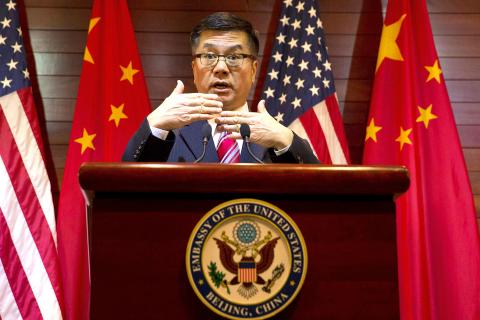Outgoing US Ambassador to China Gary Locke yesterday urged Beijing to respect the rights of peaceful political activists and said Washington was deeply concerned about the fate of a minority academic charged with separatism.
At his final news conference as ambassador, Locke said that Washington is “very concerned” about the case of Ilham Tohti, as well as a recent increase in the arrests of social and legal activists and journalists.
Tohti is an economics professor and advocate for the Uighur Muslim minority who was formally arrested and charged with separatism on Tuesday after being taken from his home one month ago.

Photo: Reuters
China should value not just the economic welfare of its people, but also their freedom of speech, assembly and religion, Locke said.
“We believe that freedom of expression is a universal right and we very much are concerned about the arrest and detentions of people who are engaged in peaceful advocacy,” Locke, accompanied by his wife, Mona, told journalists at the US embassy in Beijing.
US Department of State spokeswoman Jen Psaki on Wednesday also expressed deep concern for Tohti and called for his release.
China’s authoritarian communist government brooks no political opposition and routinely rejects such remarks. Beijing says it must take harsh measures against what it calls Islamic radical terrorists fighting for the independence of the northwestern China Uighur homeland of Xinjiang.
Chinese Ministry of Foreign Affairs spokeswoman Hua Chunying (華春瑩) defended Beijing’s record at a regular briefing on Wednesday and accused the country’s critics of political bias.
Chinese citizens enjoy “unprecedented rights and liberty,” Hua said. “We strongly oppose irresponsible comments made by anybody, regardless of which country he comes from.”
Locke also repeated the US’ calls for restraint in China’s maritime territorial disputes with Japan and its Southeast Asian neighbors. He also urged China to accord foreign journalists working in the country the same equitable treatment that Chinese journalists receive in the West, a reference to Beijing’s denial of visas to reporters from the New York Times and other news outlets.
A former US commerce secretary and two-term governor of Washington state, Locke, 63, was the first Chinese-American to serve as ambassador to Beijing. Known for his affable, non-confrontational style, Locke placed a high priority on improving embassy efficiency and facilitating bilateral trade during his two-and-a-half years in Beijing at a time when exchanges are growing rapidly.

US President Donald Trump yesterday announced sweeping "reciprocal tariffs" on US trading partners, including a 32 percent tax on goods from Taiwan that is set to take effect on Wednesday. At a Rose Garden event, Trump declared a 10 percent baseline tax on imports from all countries, with the White House saying it would take effect on Saturday. Countries with larger trade surpluses with the US would face higher duties beginning on Wednesday, including Taiwan (32 percent), China (34 percent), Japan (24 percent), South Korea (25 percent), Vietnam (46 percent) and Thailand (36 percent). Canada and Mexico, the two largest US trading

ACTION PLAN: Taiwan would expand procurement from the US and encourage more companies to invest in the US to deepen bilateral cooperation, Lai said The government would not impose reciprocal tariffs in retaliation against US levies, President William Lai (賴清德) said yesterday, as he announced five strategies to address the issue, including pledging to increase Taiwanese companies’ investments in the US. Lai has in the past few days met with administrative and national security officials, as well as representatives from various industries, to explore countermeasures after US President Donald Trump on Wednesday last week announced a 32 percent duty on Taiwanese imports. In a video released yesterday evening, Lai said that Taiwan would not retaliate against the US with higher tariffs and Taiwanese companies’ commitments to

‘SPECIAL CHANNEL’: Taipei’s most important tasks are to stabilize industries affected by Trump’s trade tariffs and keep negotiations with Washington open, a source said National Security Council Secretary-General Joseph Wu (吳釗燮) arrived in the US for talks with US President Donald Trump’s administration, a source familiar with the matter said on Friday. Wu was leading a delegation for a meeting known as the “special channel,” the Financial Times reported earlier. It marked Trump’s first use of the channel since returning to the White House on Jan. 20. Citing a source familiar with the matter, the Financial Times reported that Minister of Foreign Affairs Lin Chia-lung (林佳龍) was also a part of the delegation. The visit came days after China concluded war games around Taiwan and amid Trump’s

CHIP EXCEPTION: An official said that an exception for Taiwanese semiconductors would have a limited effect, as most are packaged in third nations before being sold The Executive Yuan yesterday decried US President Donald Trump’s 32 percent tariff on Taiwanese goods announced hours earlier as “unfair,” saying it would lodge a representation with Washington. The Cabinet in a statement described the pledged US tariffs, expected to take effect on Wednesday next week, as “deeply unreasonable” and “highly regrettable.” Cabinet spokeswoman Michelle Lee (李慧芝) said that the government would “lodge a solemn representation” with the US Trade Representative and continue negotiating with Washington to “ensure the interests of our nation and industries.” Trump at a news conference in Washington on Wednesday announced a 10 percent baseline tariff on most goods